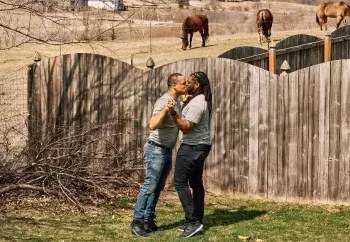
Having only ever lived in London, Miami and Provincetown, I have always appreciated that this is the equivalent of living in gay heaven. The first city was where I was born and the latter two I chose to be able to lead an openly gay life. I will confess It’s not a subject that I tend to dwell on, but in this latest political climate when our community is being attacked in so-called safe places like Florida, I have become more aware of living a secure life.
Therefore the timing of Melinda Maerker‘s new doc for Hulu’s “WE LIVE HERE THE MIDWEST” couldn’t be more relevant. It highlights the individual experiences of LGBTQI+ families who, in the face of discriminatory laws and rising hostility, are attempting to establish lives in their communities. Its not just the Midwest BUT all of them, for reason or another, live in remote parts of their States.
 Part groud-breaking pioneers and accidental martyrs for the cause, these families are not just dealing with the usual demands of raising children but are doing so in often hostile homophobic situations. They have landed in distant corners of their States either because this was their birthplace, or like Courtney and Denise who moved to Kansas with their son Marek, always wanted land, to be closer to their food, and to ranch goats! Great idea on paper but it was Marek’s experience of being bullied in school that opened their eyes to the ways in which Midwestern culture is resistant to change.
Part groud-breaking pioneers and accidental martyrs for the cause, these families are not just dealing with the usual demands of raising children but are doing so in often hostile homophobic situations. They have landed in distant corners of their States either because this was their birthplace, or like Courtney and Denise who moved to Kansas with their son Marek, always wanted land, to be closer to their food, and to ranch goats! Great idea on paper but it was Marek’s experience of being bullied in school that opened their eyes to the ways in which Midwestern culture is resistant to change.
Maerker took her camera to Des Moines to meet Nia and Katie who had met in second grade, attended the same “progressive evangelical church,” dated, married, and started a family. But when Nia came out as trans, the Church where Katie had preached, turned against them.
 Even if you are quietly wondering why these families just don’t pack up and move away, it is hard not to be swept away with some of their stories. Like that of Mario and Monte who are one out of three Black families, let alone gay families in their liberal Colorado town. However, when they joined the Military they were stationed in Nebraska, with their baby girl, and they faced total rejection from their local church where both men had played major roles .
Even if you are quietly wondering why these families just don’t pack up and move away, it is hard not to be swept away with some of their stories. Like that of Mario and Monte who are one out of three Black families, let alone gay families in their liberal Colorado town. However, when they joined the Military they were stationed in Nebraska, with their baby girl, and they faced total rejection from their local church where both men had played major roles .
As distant observers, we see how five quite different ‘chosen families’ are living their rural lives, but Maerker fails to finish this otherwise compelling doc, without drawing any conclusions at all. We end up admiring these queer families for their persistence in wanting to carve out as near perfect lives as possible but at the same time we cannot help but question if they are brave or just foolhardy.

